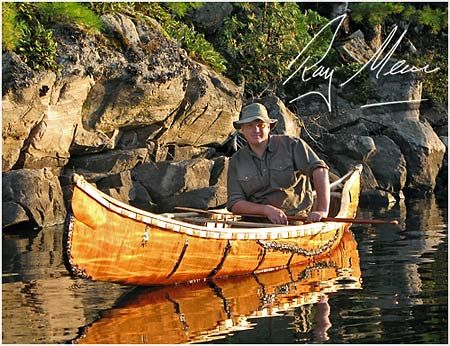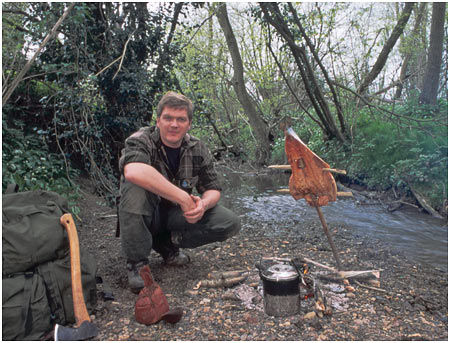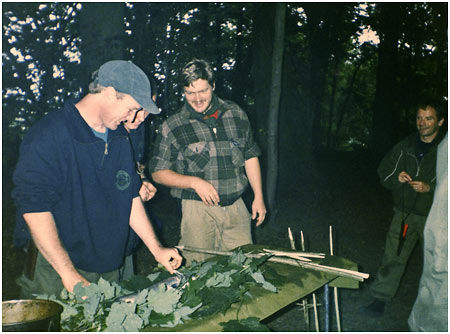About Ray Mears
Over the past two decades the name Ray Mears has become recognised throughout the world as an authority on the subject of Bushcraft and Survival. He has also become a household name through his various television series, including Tracks, World of Survival, Trips Money Can't Buy with Ewan McGregor, The Real Heroes of Telemark and many more.
These programmes have reached out and touched the hearts of everyone, from small children to grandparents. They are enjoyed by many because of Ray's down to earth approach, his obvious love for his subject and the empathy and respect he shows for indigenous peoples and their cultures.
It is obvious to some, and a surprise to others to discover that Ray has spent his life learning these skills and is truly a master of the subject he calls Wilderness Bushcraft.
Early life
Ray grew up in Southern England on the North Downs, where he discovered a countryside abundant with wildlife. Developing a unique attunement to his local environment, he learned to track foxes into the forest, never realising that he was embarking on a journey that would become his life's mission. Wanting to be able to sleep out on the trail yet unable to afford camping equipment, he resorted to a more Robinson Crusoe approach to solving the problem.
It was his school judo teacher Kingsley who fired his imagination and encouraged him to look at the world in a different way. Ray found Kingsley to be a wonderful man. He had fought behind enemy lines in Burma during the Second World War, and taught Ray to challenge conventional wisdom and practices. "You don't need equipment, you need knowledge to survive in the wild", he would tell him. "Maximum efficiency from minimum effort", was another of his themes. These simple principles have been enshrined in Ray's Bushcraft philosophy, in both his writing and his teaching.
Digesting every scrap of information relating to survival that he could find in his local library, Ray soon began to learn skills that had not been employed on the North Downs for perhaps as long as ten thousand years. Since those early days Ray has expanded his horizons, literally travelling the World many times over. Conversing in the universal language of Bushcraft, he has won the friendship of many of the Earth's first Nations, and has been privileged enough to accompany them while hunting, tracking, and searching for wild plants for food and medicine.
The Founding of Woodlore
Ray founded Woodlore, the School of Wilderness Bushcraft in 1983 and has been teaching ever since, as he puts it, "to enable others to drink at the well of Bushcraft".
When he first started, there were only a few others in the United Kingdom teaching survival courses, but survival is only one chapter of the Bushcraft story - it is the short-hand version, an ABC nutshell guide. Bushcraft is an encyclopaedia - a vast area of knowledge which is constantly being updated.
Realising that the subject can be studied at many levels, Ray has adapted his tuition to the needs of his students, a rare ability that has enabled him to teach not only civilian students but also military. At the heart though, his passion is to teach Wilderness Bushcraft as an encompassing study of nature that transcends mere cultural and linguistic differences.
Ray's Philosophy on Bushcraft
Bushcraft liberates and empowers. It re-acquaints man with nature and his roots and provides an escape from the shackles of modern life. Bushcraft is about being practical and resourceful. Rather than teach ten things, teach one which can be put to use in a wide variety of environments. Bushcraft is not a sentimental retreat into the past, a re-enactment of Aboriginal life, an exercise in Rambo-style machoism, or a cult-like spiritual experience. Ray teaches but doesn't preach. He encourages people to open their eyes and see for themselves, to enjoy their own personal sense of wonder and discovery. He is merely a guide, passing on his knowledge.
Ray is perhaps the foremost expert in his field - certainly the most well travelled; yet people are often surprised to see him rolling up his sleeves and getting stuck in with those that are enjoying Bushcraft for the first time. Nothing pleases him more than to see a student reaching beyond their own expectation of themselves, challenging their own beliefs about the world around them as they see it anew through the eyes of Bushcraft, what Ray calls "The art of the possible."


















